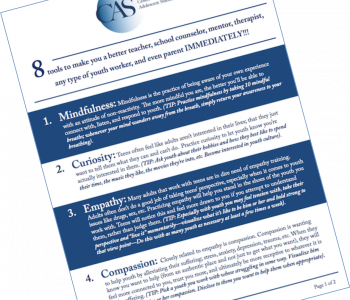

Sam Himelstein, PhD
Sam Himelstein is the founder and CEO of the Center for Adolescent Studies, Inc. He is passionate about working with youth and training the professionals that serve them.
3 Reasons Why Authenticity is a Trauma-Informed Practice
Noelle was a young woman I worked with in a school setting with a tragic story. She was what we would describe as multiply traumatized; in a sense, everything that could’ve went wrong in her life, did go wrong. One of the adverse impacts of all of her traumas was on her ability to trust others. I can clearly recall one conversation with her:
Noelle: I don’t trust anyone.
Me: Anyone at all?
Noelle: Nope.
Me: What about family?
Noelle: Nope.
Noelle’s countless traumas included physical and sexual violence, community violence, living in poverty, being in foster care, and interpersonal abuse; deceit and manipulation from those who were supposed to be her closest allies (parents, brothers, family members, etc.). Despite that, it wasn’t that difficult to build rapport with her. It wasn’t until we got deeper into our relationship that I realized the ease in which we built rapport; her agreeableness, seemingly engaged mentality, kindness, was mostly a facade. It wasn’t that she didn’t have those qualities, it was just that she wasn’t going to trust me right off the bat. And for good reason. Who was I? A therapist from a different gender, ethnic, and class background; I could only imagine what barriers might lie ahead for her to begin to be authentic with me.
So, my plan was not to push. Not to try too hard. I just told myself I was going to show up and be as authentic and attuned as possible. I wasn’t going to work too hard and try to do her work for her, but I was going to be consistent and as human as possible.
Things started to change and she started to be more honest with me. She told me about all the traumas she’d been through (how I ultimately learned about them), got deeper in sessions, let her guard down, and told me about her protective mechanism of seemingly building rapport fast and being “agreeable” and “kind” to “test people” and understand their “true intentions.” Later in our therapy relationship I asked her what helped her start to trust me.
“You just showed up as you every time. After a while I could tell you were being authentic. That was really you. And even though I can’t trust anyone else in my life, at least I know this therapist guy isn’t gonna take advantage of me.”
Being authentic is the practice of being you. It doesn’t mean you don’t think about what you say before you say it. Most people think of authenticity as a passive trait; either you have it or you don’t, or have it a little bit. But authenticity is a practice; something that can be honed in on and developed.
One of the best displays of authenticity I’ve personally witnessed is by my friend and colleague Stephen, a marriage and family therapist who I used to co-facilitate mindfulness and substance abuse groups with in juvenile halls. He and I ended up publishing the curriculum and book Mindfulness-based substance abuse treatment with adolescents: A 12-session curriculum. Stephen wasn’t from the same background as the youth we worked with. Wasn’t ever locked up himself, didn’t look anything like them, and on paper, couldn’t relate at all.
But he was comfortable in his own skin. He’d make jokes about himself from time to time to help the youth get comfortable with seemingly another White man from the system trying to “change” them, and his purpose and passion quickly shined through all the systemic crap that those young people had been through. And it paid off. I witnessed him build some of the most authentic, trusting relationships I’d seen between a therapist and young person. Youth were asking to see him in session multiple times per week; he was present and asked poignant questions that made them think. He was great at positioning himself as a caring adult in their lives; predictable, compassionate, nonjudgmental, and at the bedrock, authentic.
If we could all strive to practice authenticity more, I believe our relationships with the young people we work with (let alone our personal relationships) would improve and successful outcomes would grow. Below I present 3 simple reasons for why authenticity is a trauma-informed practice and why actively practicing it can help young people adversely impacted by trauma trust you and build real, healing relationships.
1) Youth Can Sense Inauthenticity
As I wrote about above with Noelle, youth who’ve been multiply traumatized (and especially interpersonal abuse) have a keen sense of those of use who are not authentic, i.e. those who don’t have authentic intentions in working with them. This in a way is a defense/protective mechanism. When an adult is trying too hard to act like a youth, be cool, or “get information” it often leaves youth feeling like they can’t trust you. They can sniff it out so it’s best to show up as authentic as you can as consistent as possible. That will help grow trust in your relationship.
2) Authenticity Promotes Predictability
When you’re consistently authentic you start to become predictable as an adult. This is a good thing for working with traumatized youth. Trauma and the experience that often precipitate it are often characterized by chaos. Predictability promotes safety, a must in trauma-informed care. If your personality is such that you’re “unpredictable,” and that’s who you are authentically, then working with traumatized youth may not be the most skillful occupation.
3) Authenticity Metacommunicates Authenticity
A metacommunication is the subtext between you and the youth you work with. It’s not what you say verbally, but what’s communicated without talking. It’s the vibration you emit that can be felt by the youth; sometimes referred to as presence. When you practice authenticity, the message your sending is, “it’s okay to be me.” Which promotes, “it’s okay to be you.” And “I want to know the real you” without even saying it (although it is okay to say that when appropriate).
The above are 3 simple, but potentially transformational reasons why the practice of authenticity helps build trusting, strong, and ultimately healing relationships with young people impacted by trauma. This list is by no means exhaustive, but is a core foundation of fostering interpersonal safety and practicing trauma-informed care.
Join the FREE Resilience Community for Helping Professionals to learn more about trauma-informed care, resilience, mindfulness, building relationships, and more! Our community features self-paced courses, a monthly live Zoom call, a weekly live meditation, and an online platform to connect with other providers/professionals in your field.
Related Posts
3 Ways Compassion Can Help Youth Impacted by Trauma
4 Qualities That Lead to Interpersonal Connection and Safety with Youth
6 Tips for Building Authentic Relationships with Adolescents

